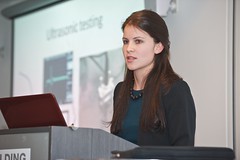Two EngD research engineers have recently written website articles about their activities.
The EngD: Dr Who?
Richard Howard, studying in the Non-Destructive Evaluation industrial doctorate centre and based at London's Imperial College, wrote a feature, The EngD: Dr Who? for the college's online publication, Felix. He is clearly enthusiastic about both the programme itself and the immediate and long-term benefits it offers. Here's a few soundbites....Merging the academic with the practical, it is a fulfilling way to apply the piles of knowledge that you have accumulated over your undergraduate years to real world problems. ...
... the doctoral students become experts in a key industry that will be relevant for many years to come. The remit of the doctorate is also to train future business leaders in these areas as well as furnishing them with technical expertise. For example, the UK’s renewed interest in nuclear power underscores the need for a new generation of nuclear engineers and since there is a dearth in nuclear experts (of all types) the current cohort of EngD nuclear engineers will be the ones running the industry in the future.
Importantly, the scheme is NOT just for engineers, scientists are actively encouraged...
If you are looking for a career in a particular industry, or at particular company, then an EngD can easily be far more than a foot in the door; more like a whole leg! You’ll work closely with your sponsor’s researchers and will make a raft of contacts, setting you up nicely.
Finally, when it comes to pay there should be no beating around the bush; an EngD candidate gets one of the highest academic postgraduate stipends available... This is the way it should be, treating you like a graduate research engineer with a pay scale to match.
Maria's Diary
Maria Felice, is also an EngD research engineer with the Non-Destructive Evaluation industrial doctorate centre, but is supervised from its University of Bristol site. She is based at Rolls Royce plc and was a finalist in the 2013 AEngD Research Writer of the Year competition. For the Institution of Engineering and Technology (IET) she wrote a diary entry highlighting her recent activities. She clearly valued the AEngD conference, and is worried about recent changes to EngD funding:
There was a meeting for EngD students - or ‘research engineers’ - at the conference, which was a great opportunity to talk to students from other EngD centres. At each university there are not many EngD students so we tend to become part of the PhD community, but there are actually quite a lot of differences between the two programmes e.g. EngD students tend to be based in industry.
...
A few days prior to the conference, it had been announced that funding for EngDs will be drastically reduced. This was a big shock since all stakeholders seem to be in agreement that the EngD is a highly successful scheme that is beneficial to the UK industry. It was not a surprise, therefore, that this was the main topic of conversation at the conference. However, it was still a fantastic celebration of the EngD scheme and the funding decision is going to be challenged.



